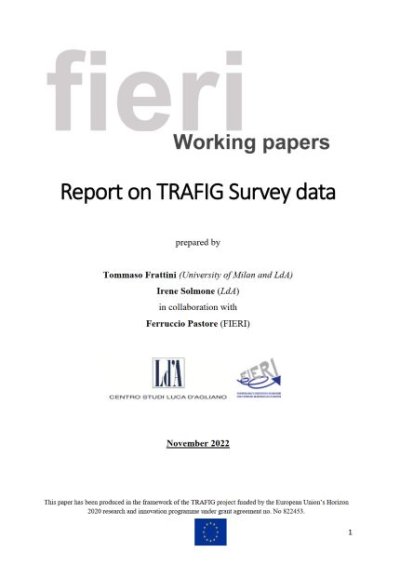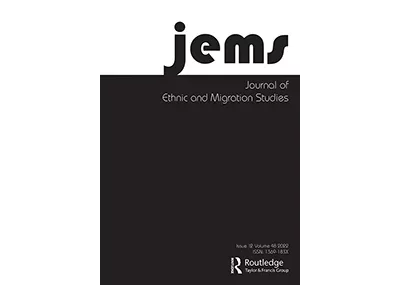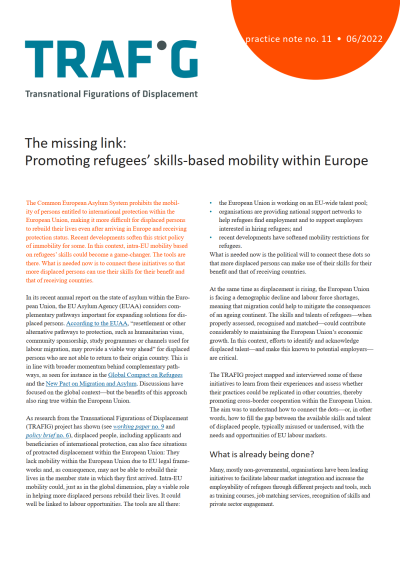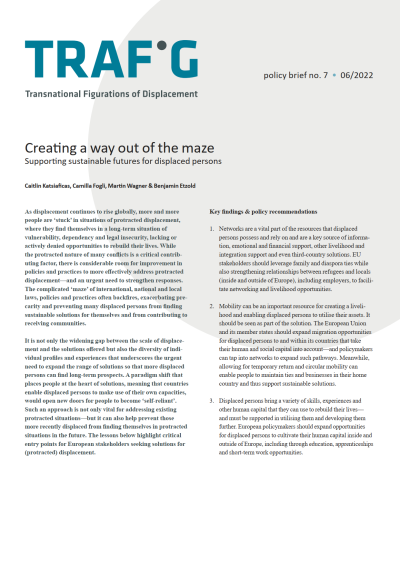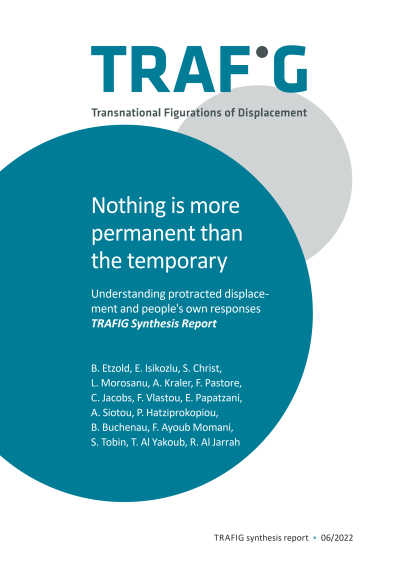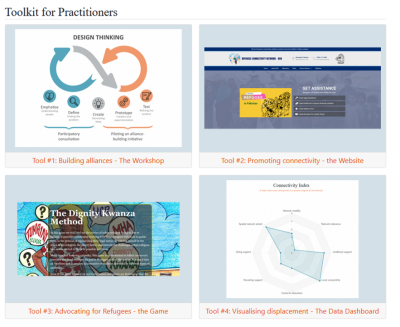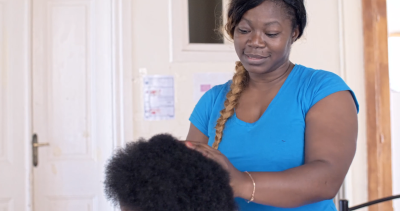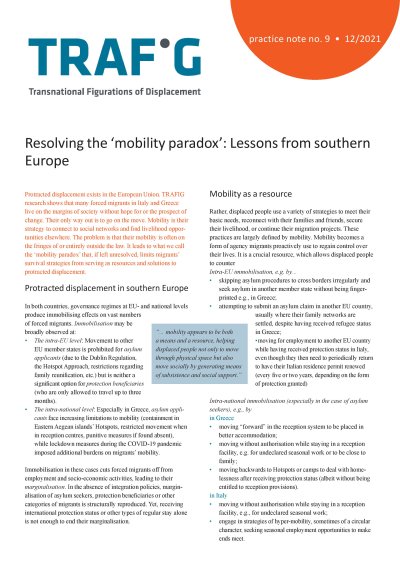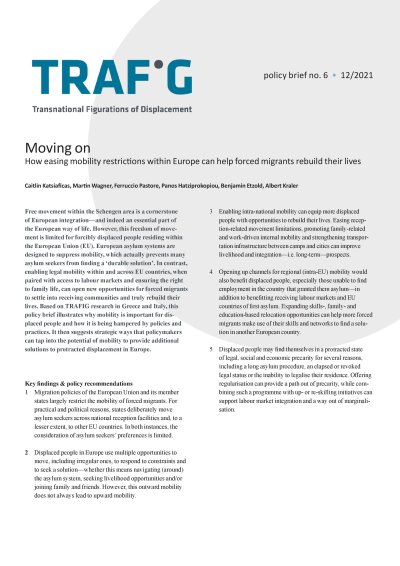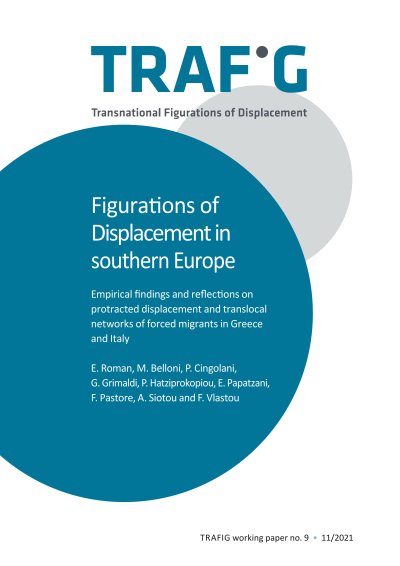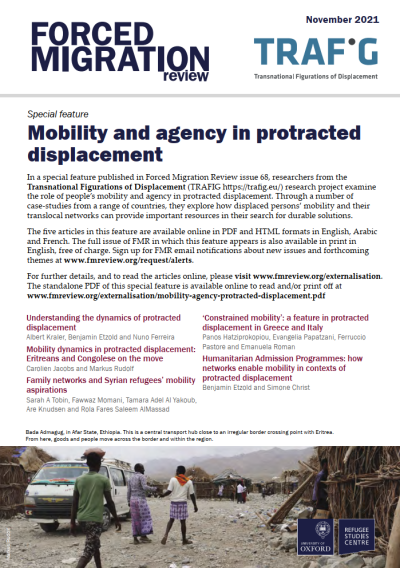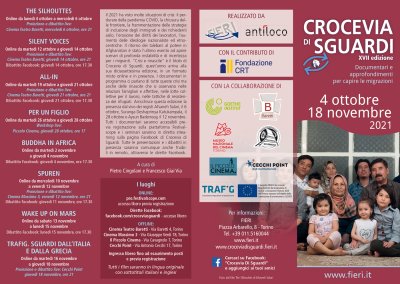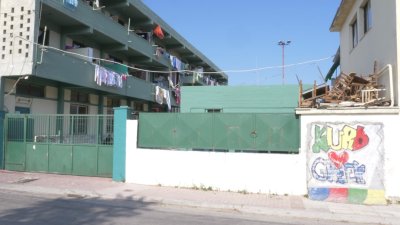Greece
In Greece, researchers from the Aristotle University of Thessaloniki undertook research on the Northern Aegean Islands, in Athens and Thessaloniki. They spoke with more than 450 people, predominantly from Syria, Afghanistan, Congo and Pakistan.
Inhabiting the permanently temporary: readings of protracted displacement in Greece
TRAFIG at the Geographies' conference in Greece
On 26 November 2022, colleagues from the Aristotle University in Thessaloniki organized a thematic panel at the 3-day national Conference “Crises, Resistances, Prospects” at Harokopio University in Athens... Read more
Special Issue in JEMS
Unsettling Protracted Displacement: Connectivity and Mobility beyond Limbo
Key results and reflections from the TRAFIG project have just been published in a special issue in the Journal of Ethnic and Migration Studies (JEMS).
The 9 contributions present novel insights of empirical research in African, Asian and European countries on the role of connectivity and mobility in the lives of displaced people, they critically engage with policies, legal frameworks and structures that keep displaced people in an ongoing state of limbo, they reflect upon the concept of protracted displacement and seek to advance its understanding, and they employ a figurational approach in their analysis.
All 9 articles are freely accessible via the publishers website: Read more
1 Introduction: Unsettling Protr
...TRAFIG practice note no. 11
The missing link
Promoting refugees’ skills-based mobility within Europe
The Common European Asylum System prohibits the mobility of persons entitled to international protection within the European Union, making it more difficult for displaced persons to rebuild their lives even after arriving in Europe and receiving protection status. Recent developments soften this strict policy of immobility for some. In this context, intra-EU mobility based on refugees’ skills could become a game-changer. The tools are there. What is needed now is to connect these initiatives so that more displaced persons can use their skills for their benefit and that of receiving countries. Read more
TRAFIG policy brief no. 7
Creating a way out of the maze: Supporting sustainable futures for displaced persons
As displacement continues to rise globally, more and more people are ‘stuck’ in situations of protracted displacement, where they find themselves in a long-term situation of vulnerability, dependency and legal insecurity, lacking or actively denied opportunities to rebuild their lives. Drawing lessons from more than 3 years of research, this policy brief highlights critical entry points for European stakeholders seeking solutions for (protracted) displacement. Read more
TRAFIG Synthesis report
'Nothing is more permanent than the temporary' – Understanding protracted displacement and people's own responses
Final report sums up findings of 3 1/2 years of TRAFIG research.
Across the world, 16 million refugees and an unknown number of internally displaced persons (IDPs) experience long-lasting conditions of economic precarity, marginalization, rightlessness and future uncertainty. They live under conditions of protracted displacement. Policy solutions often fail to recognise displaced people’s needs and limit rather than widen the range of available solutions.
This report brings together the central findings of the TRAFIG project’s empirical study in the Democratic Republic of the Congo (DRC), Ethiopia, Tanzania, Jordan, Pakistan, Greece, Italy and Germany. We... Read more
Toolkit for Practitioners: Building Webs of Connections
This toolkit brings together practical outputs on solutions to protracted displacement.
Practitioners can promote or support displaced people's connectivity. Helping to build a web of connections allows displaced people to move ahead in life and to belong to others.
The toolkit entails 4 examples from our work:
Tool #1: Building alliances - The Workshop
Tool #2: Promoting connectivity - the Website
Tool #3: Advocating for Refugees - the Game
Tool #4: Visualising displacement - The Data Dashboard
Learn more about these tools, how we developed them and used them in our work. Read more
Crafting Futures
For some time now, Greece has been a passage for people seeking security and better life prospects in Europe. In recent years it has become a necessary stopover. Having experienced multiple losses and passed through long and difficult journeys, many may see their displacement getting protracted, as they are faced with border and migration regimes. Yet their lives and deeds are not only marked by immobility, passivity and victimhood, but also daily struggle, learning and creativity, intimate encounters and connections with places, institutions and people. The documentary narrates fragments of the everyday life of persons who have lately found themselves displaced in different parts of Greece. Their stories together articulate a polyphonic stapling of such encounters and conn... Read more
TRAFIG practice note no. 9
Resolving the ‘mobility paradox’ - Lessons from southern Europe
available in English, Italian, Greek
Protracted displacement exists in the European Union. TRAFIG research shows that many forced migrants in Italy and Greece live on the margins of society without hope for or the prospect of change. Their only way out is to go on the move. Mobility is their strategy to connect to social networks and find livelihood opportunities elsewhere. The problem is that their mobility is often on the fringes of or entirely outside the law. It leads to what we call the ‘mobility paradox’ that, if left unresolved, limits migrants’ own survival strategies from serving as resources/solutions to protracted displacement.
Based on the TRAFIG research in Italy and Greece - the results of which can... Read more
TRAFIG policy brief no. 6
Moving on
How easing mobility restrictions within Europe can help forced migrants rebuild their lives
Free movement within the Schengen area is a cornerstone of European integration – and indeed an essential part of the European way of life. However, this freedom of movement is limited for forcibly displaced people residing within the European Union (EU). European asylum systems are designed to suppress mobility, which actually prevents many asylum seekers from finding a ‘durable solution’. In contrast, enabling legal mobility within and across EU countries, when paired with access to labour markets and ensuring the right to family life, can open new opportunities for forced migrants to settle into receiving communities and truly rebuild their lives. Read more
TRAFIG working paper no. 9
Figurations of Displacement in Southern Europe
Empirical findings and reflections on protracted displacement and translocal networks of forced migrants in Greece and Italy
This working paper is based on empirical research on the Translocal Figurations of Displacement in Greece and Italy. The authors aim to compare protracted displacement in Greece and Italy, looking at the structural forces shaping it and their interactions with migrants’ mobility and connectivity. This comparison is based on the analysis of the relations between two contextual variables (governance regimes and host population) and three key variables (mobility, connectivity and marginalisation). In this paper, they present findings from three study sites in Greece and four research locations in Italy.
Findings sho... Read more
Mobility and agency in protracted displacement
Available in English, French and Arabic
The latest issue of the Forced Migration Review includes a special feature on mobility and agency for those living in protracted displacement, produced in collaboration with the TRAFIG project. Read more
- Understanding the dynamics of protracted displacement
- Mobility dynamics in protracted displacement: Eritreans and Congolese on the move
- Family networks and Syrian refugees’ mobility aspirations
- ‘Constrained mobility’: a feature in protracted displacement in Greece and Italy
- Humanitarian Admission Programmes: how networks enable mobility in contexts of protracted displacement
Release of two TRAFIG Documentaries at the Film festival "Crocevia du Sguardi" \
Throughout their fieldwork activities, the TRAFIG teams in Italy and Greece were accompanied by camera teams. Based on this footage, two video documentaries have been produced which capture the realities of persons affected by protracted displacement. The two documentaries "Is my place here? Living as a refugee in Italy" directed by Andrea fantino and "Crafting futures" directed by Michalis Kastanidis and Io Chaviara are available for free from Tuesday 16 November at 21:00 to Sunday 21 November at 24:00 here.
The Italian documentary "Is my place here? Living as a refugee in Italy" will be also live screened on Thursday November 18th, 9pm at Cecchi Point (Turin). The documentary will be discussed by Ferruccio Pastore (FIERI Director), Pietro Cingolani (University of Bologna... Read more
The camp and the city: Insights from a multi-stakeholder community consultation in the port of Lavrio in Attica (Greece)
by Filyra Vlastou Aristotle University of Thessaloniki
Introduction and context
During June and July 2021, the Greek team carried out a set of multi-stakeholder community consultations (MSCC) in the port of Lavrio. The small town of more than 7,000 inhabitants in southern Attica had hosted three refugee camps until very recently: The former state-, now self-organised old Lavrio camp located in the very centre of the town since 1947, a makeshift campsite created in 2010 in Neraki, an area about one kilometre away from the town, and the official camp of Lavrio (located at neaby Sounio), founded in 2017 and closed in June 2021, located approximately five kilometres outside the town. The old Lavrio camp, located right in the heart of the town—around the corner from the central square, n... Read more
Update of the TRAFIG fieldwork in Greece
Eva Papatzani, Filyra Vlastou, Alexandra Siotou and Panos Hatziprokopiou from the TRAFIG Team in Greece, report on their activities and insights from the fieldwork in Athens, Lesvos and Chios, and Thessaloniki since September 2020.
Athens
From September to early November 2020 (start of second national lockdown), Eva Papatzani conducted multiple interviews with displaced persons from Syria, Afghanistan, the DR Congo and Pakistan, as well as a focus group discussion with refugees settled in Athens for decades working as interpreters in the humanitarian sector. A significant number of these interviewees (either residing in camps or ESTIA apartments in Athens) find themselves in precarious conditions due to the planned obligatory exits from the official accommodation system, whi... Read more

